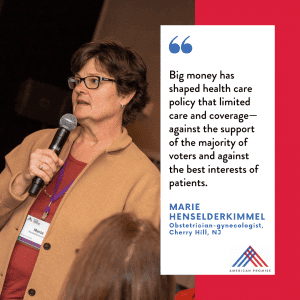The COVID-19 pandemic has drawn new attention to policy-related issues including access to and costs of health care in the U.S. American Promise citizen leaders who have worked in the health-care industry recently shared how they have seen lobbying influence the policy that affects patients’ quality of care and why they are among those calling for a Constitutional amendment to reduce the influence of big money in politics.

With a Ph.D. in clinical psychology and a master’s degree in nursing, Port Clinton, Ohio, American Promise citizen leader Ellen Greene Bush has worked most of her career as a psychologist in a group practice. Inspired by a presentation about the recently formed Business for American Promise group at last year’s National Citizen Leadership Conference, Ellen began to draw parallels between “crony capitalism” in business and her experiences in the health-care industry.
She connected with fellow health-care workers in the AP citizen leadership community. Marie HenselderKimmel, a Cherry Hill, New Jersey, obstetrician-gynecologist who practiced for 25 years, grew increasingly frustrated by repeated instances of Congressional policy and legislative actions that favored the goals of special interest groups rather than concerns about access to and affordability of care for patients. Robbi Duda, MS, RN, an advanced practice registered nurse who lives in Ann Arbor, Michigan, says she sees many patients getting questionable care because of insurance company lobbying.
When a congressional committee met in February for a hearing on an amendment to get big money out of politics, Robbi, Marie and Ellen joined forces to submit testimony from their vantage point as health-care providers. In their testimony, the three explained how unlimited political spending distorts policy that shapes the American health-care system and ultimately affects all patients. The three were also all recently interviewed for a Democracy4Change.org podcast to discuss their advocacy.
In this Q&A, we talk with Marie, Ellen and Robbi about their experiences in the health-care industry, and why they support a Constitutional amendment to return balance in health-care policy-making to the people, rather than wealthy special interests.
How have you seen big money influence the U.S. health-care system?
Marie: Big money shapes health-care policy to limit care and coverage, against the wishes of the majority of voters and against the best interests of patients.
Ellen: Yes. Health-care corporations are no longer responsive to their constituency—the patients—as much as to special interests that vie for profits, market share, and other advantages. Health-care providers are caught in this predicament—responsible for and devoted to working with patients, but having limited authority to make decisions, especially corporate ones, that also affect patients in the office or at the bedside.
This pandemic brings these issues to the forefront. Health professionals are working without adequate isolation protection, limited testing resources, and potentially make-shift ICUs and ventilators. They don’t have time to lobby Congress. And yet big corporations are lobbying for a share of an economic relief package. Let’s get our priorities straight.

Marie: In numerous investigative reports, the Center for Responsive Politics has shown that outside spending in elections has grown exponentially by groups with names like Center to Protect Patient Rights, which are funded by undisclosed donors who have been revealed to be corporate and special interest groups, not “patients” at all.
Spending by these outside groups tilts the balance of power to those who can pressure politicians to support their special interests by donating in support of their campaigns or by raising political pressure against the politician to coerce their votes. Ordinary citizens do not have equivalent financial capital to compete and shape their government’s policy and improve their own health care.
How does this affect patient care?
Marie: Here’s an example: When seniors faced daunting medication costs, new laws regarding Medicare pharmacy benefits included a prohibition on the common-sense solution of enabling Medicare to negotiate drug costs with pharmaceutical companies. This occurred after a pattern of escalated big pharma political spending focused on the legislators working on these issues.
Or, when the Affordable Care Act was negotiated in Congress, options that could have dramatically lowered costs for patients were abandoned in the face of extensive lobbying and spending by the health-insurance and health care lobby.
Robbi: We often talk about the millions of Americans who are unable to access insurance, which is a critical issue, but I also see a lot of people getting questionable care because they do have insurance. For example: A few years ago I started to see clients getting AV fistula ports inserted in their arms. They were told they should have this because their kidney function was poor and they may need to get dialysis soon, even though they were perfectly healthy at the time.
Eventually all of my clients had them removed because of infection before ever needing dialysis.
That occurred after heavy lobbying to build dialysis centers and get Medicare to cover diabetes treatments, medications, medical devices and procedures. The Center for Responsive Politics found that in 2019 DaVita Inc., one of the country’s largest dialysis services providers, spent almost $4 million on lobbying. The sad thing is that so much cost and suffering could be avoided with a simple intervention to prevent and treat type 2 diabetes.
Ellen: And when it comes to mental health care, there are other problems. Most patients cannot afford mental health care; in fact, many cannot afford their co-pays. Provider-patient time is lost when providers have to volley for mental health-care benefits with insurance companies.
But by far the most insidious change taking health-care workers from patient care is the electronic medical record (EMR). Primary care doctors spend nearly two hours typing into the EMR for every one hour of direct patient care. Most physicians do this work after office hours and on weekends. It takes their energy away from patient care, but reimbursement from the government and insurance companies depends on this electronic record. There is big money in health information technology. So it follows that technology vendors spend millions per year on lobbying Congress.
How would reducing the influence of big money in health-care policy benefit average American citizens?
Robbi: Well, for one thing, we might see more emphasis on prevention of illness and on palliative (comfort) care for our elderly and dying.
Ellen: Exactly. Lobbying by hospital systems has resulted in an emphasis on end-of-life sickness care rather than public health issues such as clean water, or wellness initiatives such as affordable insulin.
Robbi: If there were controls on campaign finance spending like comprehensive small-donor systems, and limits and transparency on lobbying, our legislators would serve voters, not special interests, and therefore be incentivized to create a better democracy and a more equitable health-care system.
Marie: Eliminating the influence of big money in health-care policy would remove the incentives to lawmakers to benefit the profits and interests of health-care industries, which would allow cost cutting in our expensive health-care system and prioritize better delivery of care to benefit the best health interests of all American citizens.






